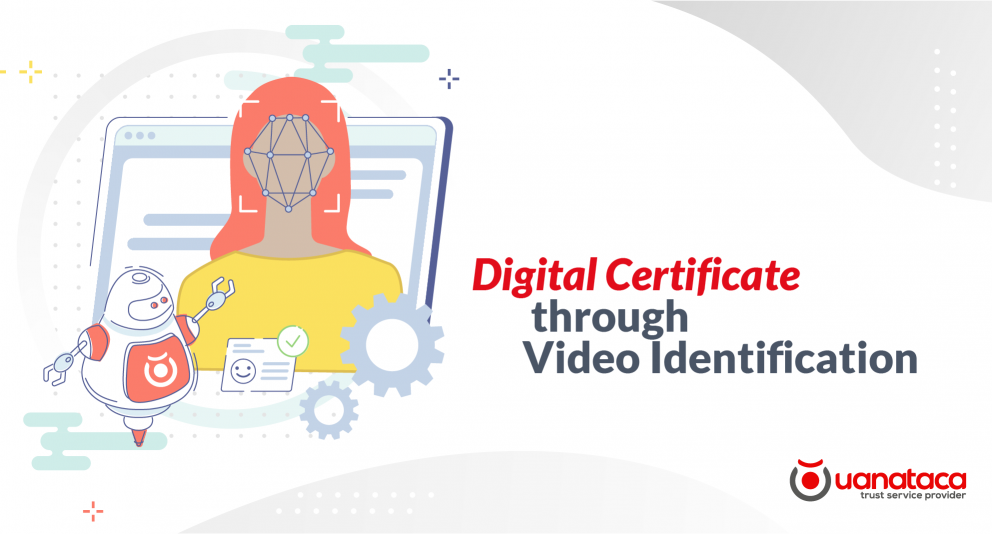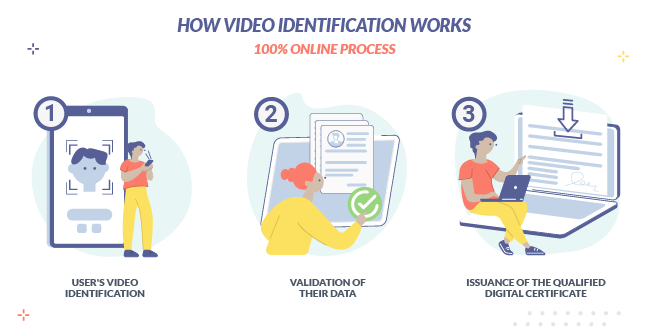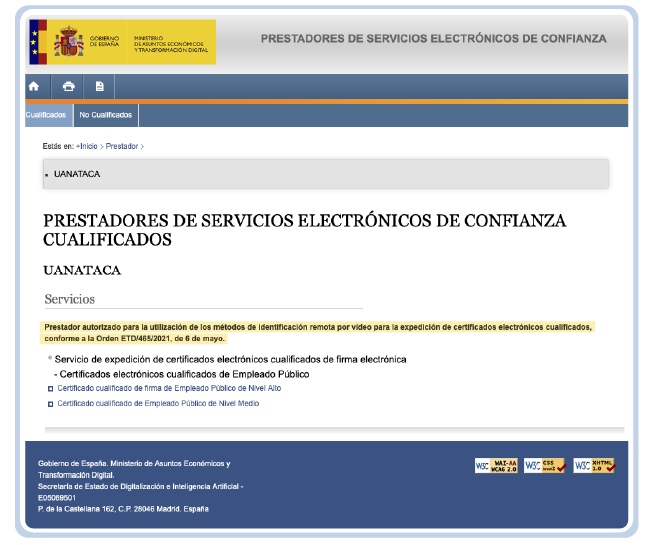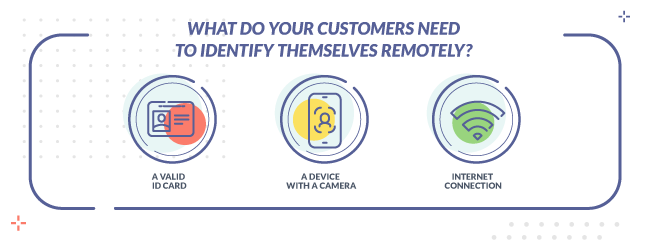
In 2021, after years of waiting, came the good news of the publication of Order ETD/465/2021, which regulates in Spain the methods of remote video identification for the issuance of qualified digital certificates. The purpose of this regulation is to authorize a new system for issuing qualified certificates without having to go in person to an office to identify oneself.
After a process in which it has demonstrated its ability to provide the legal levels and the necessary evidence to prevent fraud, Uanataca has become the first and only provider certified to issue qualified certificates remotely.
In this post we solve some of the most common doubts about the video identification process, its security and the advantages of issuing qualified digital certificates through video identification.
What is video identification or remote identification through video call?
Until now, face-to-face identification was the only method recognized in Spain for issuing a qualified digital certificate. This meant that people had to travel to an authorized office to identify.
The need to replace this face-to-face process with a remote identification system has been fueled by the activity and mobility restrictions of the pandemic and the shift in consumer habits from physical to digital.
In a remote system, face-to-face identification is replaced by a video identification system, with technology that combines live video calls with artificial intelligence, allowing the identity of individuals to be validated remotely in a matter of seconds. Subsequently, the holder is issued a qualified digital certificate, completing the process 100% online.
What is the process to issue a qualified digital certificate through video identification?
The issuance of a qualified digital certificate by remote identification is a process that can only be carried out by a recognized provider for this purpose.
Regarding the assistance, the remote identification process can be performed in an assisted or unassisted way. In both cases, a specialized operator will be responsible for validating the identity, either by reviewing the data live or later thanks to the video provided.
In both assisted and unassisted identification, the video identification process is completed in a few simple steps:

1.- Video identification of the user: the authenticity and validity of the identification document provided and the correspondence with the image are verified. To avoid fraud, measures are taken to reduce the risk of identity theft, for example, performing a series of specific actions that represent proof of life, such as smiling or blinking.
2.- Validation of your data: the specialized operator validates the data provided. During the process and in case of any suspicion of criminal activity, the operator may reject the identification for justified reasons. Issuance of the qualified digital certificate: the holder receives his qualified digital certificate that he can use immediately to identify himself in any electronic office or to sign any kind of documents.
3.- Issuance of the qualified digital certificate: the holder receives his qualified digital certificate that he can use immediately to identify himself in any electronic office or to sign any kind of documents.
Is video identification secure? Requirements to be met by a system for issuing certificates via video identification
According to the eIDAS Regulation, only a Qualified Trust Service Provider such as Uanataca can issue qualified digital certificates, which means that only it can do so by video identification. To do so, its system must be certified by a Conformity Assessment Body: an independent conformity assessment body.
The Conformity Assessment Body is accredited to verify compliance with the minimum measures to ensure functional and security equivalence with the methods of identification by physical presence, as well as the collection and safeguarding of evidence of the process.
Which providers are authorized in Spain to issue qualified digital certificates through video identification? Uanataca is the first and only provider certified by the Ministry of Economic Affairs and Digital Transformation.

The security measures include the invalidation of the identification process by the operator in the event of any indication of falsification or manipulation of the identity document.
In terms of indications or circumstances, the lack of correspondence between the applicant and the holder of the document, any impediment or difficulty in completing the verification or even the existence of indications of the use of prerecorded files may be grounds for declaring the identification null and void. In short, the whole set of measures ensures that the identification process is completely secure and guaranteed from start to finish.
What kind of digital certificates can be issued via video identification
Unlike unqualified ones, qualified digital certificates are the only ones that offer the user additional guarantees, such as maximum data protection. In this sense, the recognition of remote identification for the issuance of this type of certificates represents a milestone: a 100% online process without having to give up the maximum guarantees of qualified certificates.
Thanks to remote identification, it will now be possible to request any type of qualified digital certificate. Below, we list the most popular ones with the characteristics of their recipients:
1.- Citizen or self-employed digital certificate: digital certificate intended for natural persons as citizens or self-employed. Especially companies can benefit from this possibility by providing employees or customers with qualified certificates without the need to identify them in person.
2.- Digital certificate of representative of legal entity: digital certificate for legal representatives of Limited Companies.
3.- Digital certificate of representative of entity without legal personality: digital certificate destined to Presidents or Administrators of communities of neighbors.
Advantages offered by video identification to companies
The possibility of identifying people remotely and issuing digital certificates that can be used to sign or authenticate will make it easier for companies to digitize, with processes that ensure access to a secure, inclusive and interoperable digital identity.
Thanks to video identification, your customers and/or employees will be able to identify themselves from anywhere and without having to travel. All they need is a device with a camera, their ID card and an Internet connection.

ADVANTAGES OF VIDEO IDENTIFICATION
> 100% online process 👨💻: from anywhere and at any time, the user can be identified remotely. At the enterprise level, higher levels of expansion are achieved and conversion rates are increased.
> Added value ➕: end-to-end digitalization (e2e) adds value to the service, improving the user experience. As a result, it increases the level of consideration with respect to the competition.
> Omnichannel 📱: identification can be performed from any device with a camera, even from a cell phone.
> Technical and legal security 🔐: conditions, technical requirements for remote verification and other specific attributes to prevent fraud are regulated and monitored to ensure the reliability of the process.
Uanataca Video Identification System
Uanataca makes available to companies its solutions for electronic signature and issuance of digital certificates through its video identification system.
Any business, regardless of the sector in which it operates, will be able to benefit from the advantages offered by qualified digital certificates: veracity of the data contained, particular guarantees offered by the PCSC or the possibility of making qualified electronic signature, the only one comparable to the handwritten signature. And all this, without the obligation to identify the holder in person.This will be a great competitive advantage with a range of possibilities. In the financial sector, there are many practical cases. For example, a customer will be able to apply for a loan remotely and instantly sign all the transaction documents using a qualified electronic signature certificate. In this way, in addition to increasing conversion, the real guarantees of authenticity, integrity and non-repudiation or linkage to the content prevent the signatory from easily denying its legal effects.
>> RELATED POST: 🔥 The Spanish Justice absolves the defendant of the payment of a credit that was not signed by means of a qualified certificate of electronic signature.
The same happens in other sectors such as insurance, telecommunications, education or health: customers, employees or other agents involved in the activity will be able to identify themselves remotely with maximum guarantees.
We will notify you as soon as everything is ready to issue qualified digital certificates online.
Start the digital transformation of your business today. Do you need advice?
Contact us and a trusted service specialist will guide you on the best electronic signature solution for your business.